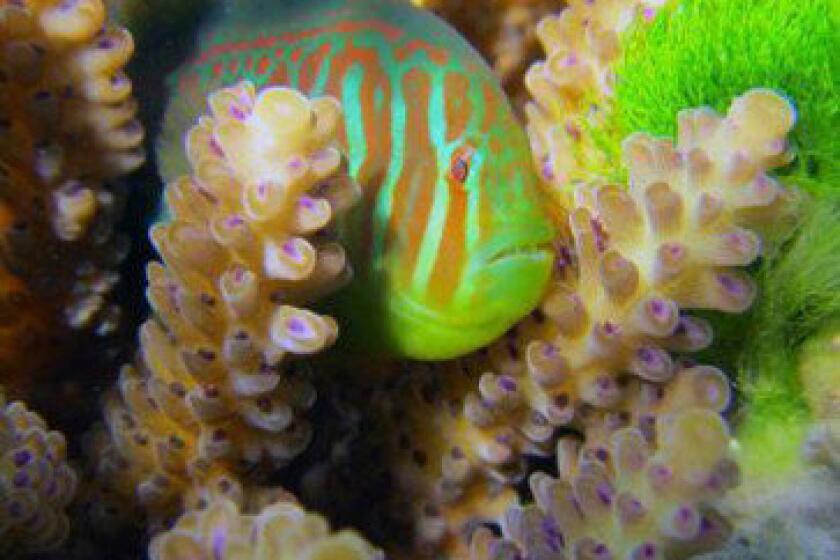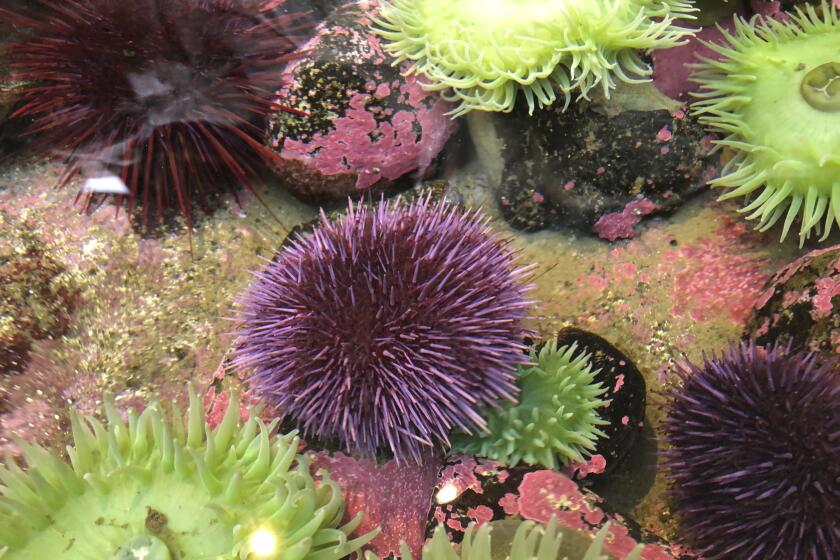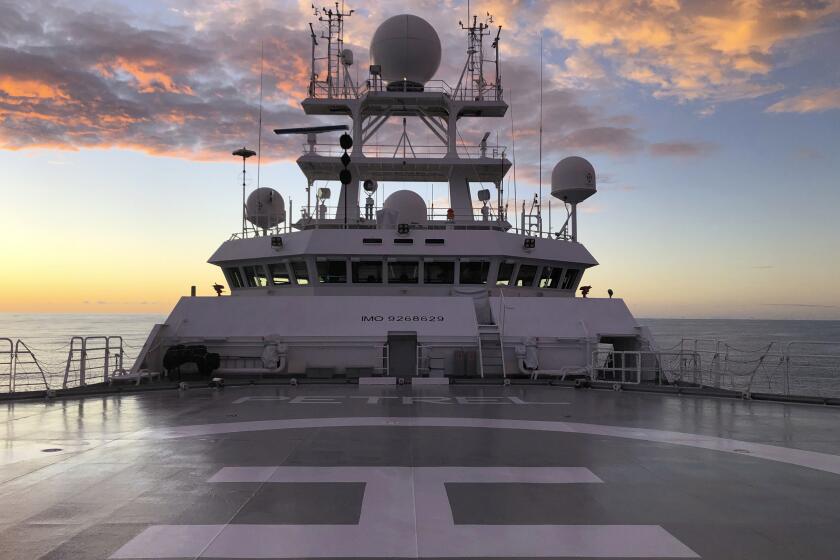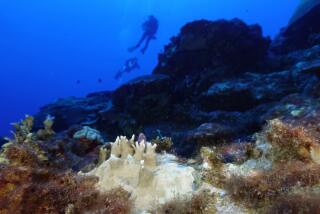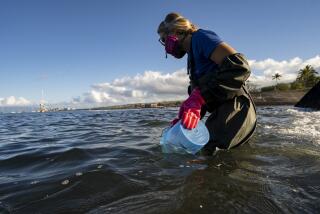Aggressive new seaweed is killing coral reefs in remote Hawaiian island chain
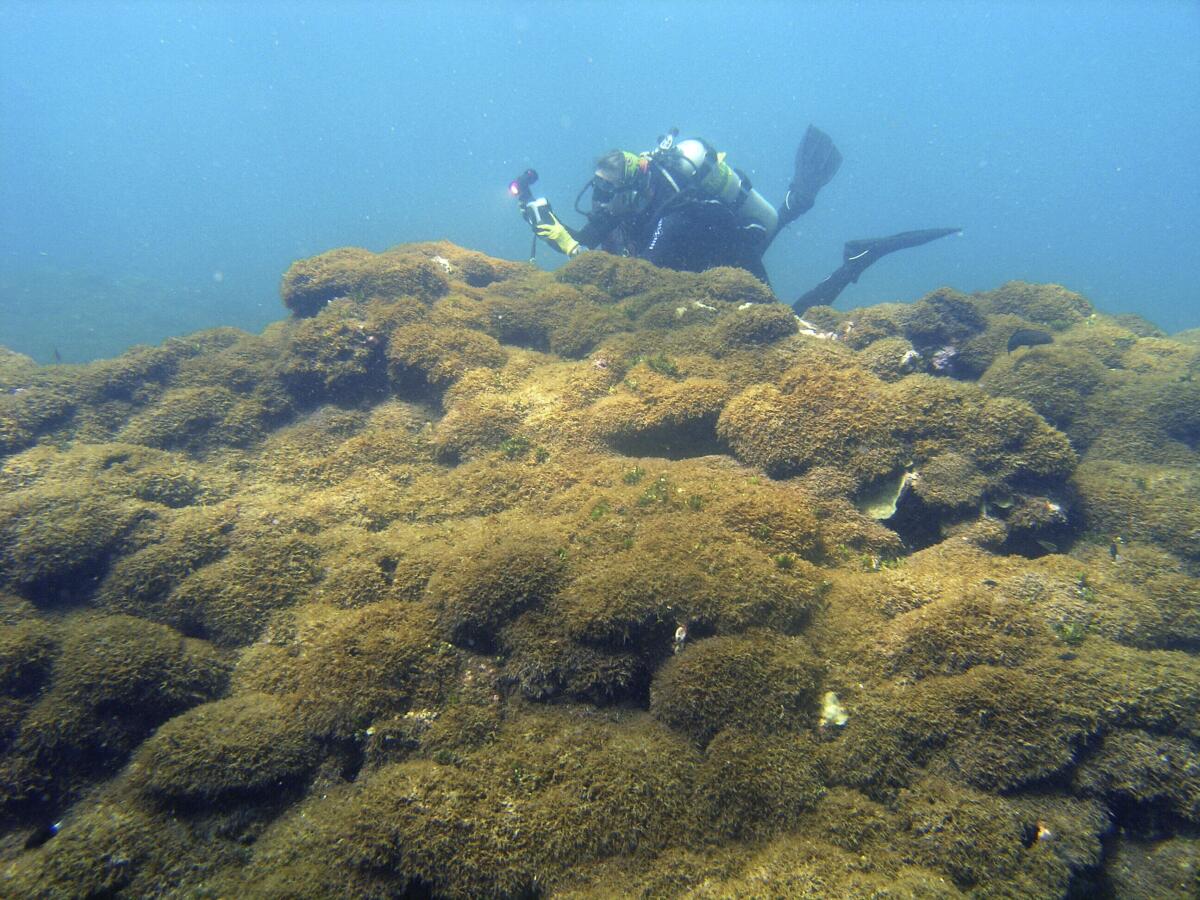
HONOLULU â Researchers say a recently discovered species of seaweed is killing large patches of coral on once-pristine reefs in the Northwestern Hawaiian Islands and is rapidly spreading across one of the most remote and protected ocean environments on Earth.
A study from the University of Hawaii and others says the seaweed is spreading more rapidly than anything theyâve seen before in the Northwestern Hawaiian Islands, a nature reserve that stretches more than 1,300 miles north of the main Hawaiian Islands.
The study was published Tuesday in the journal PLOS ONE.
The algae easily breaks off and rolls across the ocean floor like tumbleweed, scientists say, covering nearby reefs in thick vegetation that out-competes coral for space, sunlight and nutrients.
âThis is a highly destructive seaweed with the potential to overgrow entire reefs,â said biologist Heather Spalding, a study co-author and longtime Hawaii algae researcher. âWe need to figure out where itâs currently found, and what we can do to manage it.â
In 2016, government researchers were on a routine survey of Pearl and Hermes Atoll when they found small clumps of seaweed theyâd never seen before.
When seaweed attacks, corals call on goby fish to bite back
Last summer, they returned to find algae had taken over huge areas of the reef â in some areas covering âeverything, as far as the eye could seeâ â with seaweed nearly eight inches thick, said Spalding, who was among the divers there.
âEverything underneath ... was dead,â she said.
The area was mostly devoid of large schools of tropical fish and other marine life that usually cruise the vibrant reef, and fish that typically eat algae were not grazing on the new seaweed, researchers said.
Divers along the outer reef of the 15-mile atoll discovered the seaweed in varying densities and at varying depths.
An invasion of millions of voracious purple sea urchins has plunged the Pacific Coast ecosystem into such disarray that species are starving to death.
Scientists say the actual coverage area is likely much larger than documented because they couldnât survey many sites during their brief visit.
Close to Midway Atoll, site of a pivotal World War II air and sea battle, Pearl and Hermes Atoll is mid-Pacific about 2,000 miles from Asia and North America.
The uninhabited atoll is in the 600,000-square-mile Papahanaumokuakea Marine National Monument, one of the worldâs largest protected marine environments.
Noting that individual mats of seaweed were as big as several soccer fields, researchers say the algae could dramatically alter Pearl and Hermesâ reef and threaten the entire Hawaiian archipelago if it spreads.
A group of deep-sea researchers looking for sunken World War II ships has found a second Japanese aircraft carrier that went down in the Pacific during the historic Battle of Midway.
Hawaiiâs main islands have several established invasive seaweeds, but cases in the remote northwest are rare.
âWe have not, until now, seen a major issue like this where we have a nuisance species thatâs come in and made such profound changes over a short period of time to the reefs,â said University of Hawaii at Manoa Interim Associate Dean and Professor Alison Sherwood, the chief scientist on the study.
Researchers studied the seaweedâs DNA to try to determine its origin but concluded itâs a new species of red algae they named Chondria tumulosa.
The algae can spread in various ways, Sherwood said. It produces tumbleweed-like clumps that move around the immediate area, but it also generates spores that could be traveling much greater distances.
Among the unknowns are why the algae is growing so fast and how it reached such a remote place.
Toward a more sustainable California
Get Boiling Point, our newsletter exploring climate change, energy and the environment, and become part of the conversation â and the solution.
You may occasionally receive promotional content from the Los Angeles Times.
Scientists say seaweed blooms happen worldwide and can be seasonal, but this does not appear to be the case. The National Oceanic and Atmospheric Administration has been monitoring the site for over 20 years.
âWhen you see something unusual in the last few years, you can be pretty sure that this is something thatâs a bit special as opposed to just things that change from year to year,â said University of Queensland Professor Peter Mumby, who is also chief scientist for Australiaâs Great Barrier Reef Foundation. âBut it is a matter of concern whenever you see an ecosystem start to display symptoms ... like this.â
Mumby, who was not involved with the Hawaii research, said more needs to be done to understand what is driving the seaweed growth.
The NOAA research crews will soon return to study the outbreak and find out whether currents have spread it to nearby Midway, home to the Battle of Midway National Memorial, a U.S. Fish and Wildlife Service base and the regionâs only airstrip.
The first order of business, officials say, is to ensure anyone studying the seaweed doesnât inadvertently spread it.
âAll of our dive gear, all of our boats, everything got saturated with bleach,â said Randall Kosaki, NOAA research coordinator at the marine monument and expedition lead for the earlier surveys.
âIf something like this got back to Waikiki or anywhere in the main Hawaiian Islands, it would be an ecological disaster but also an economic disaster,â Kosaki said. âYou can imagine what that would do to tourism to have an algae like this overgrowing the reefs.â
More to Read
Sign up for Essential California
The most important California stories and recommendations in your inbox every morning.
You may occasionally receive promotional content from the Los Angeles Times.
